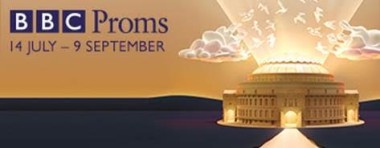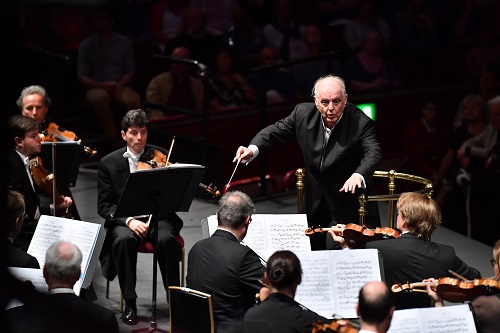
 United Kingdom 2017 BBC PROMS 2 – Sibelius and Elgar: Lisa Batiashvili (violin), Staatskapelle Berlin / Daniel Barenboim (conductor), Royal Albert Hall, London, 15.7.2017. (AS)
United Kingdom 2017 BBC PROMS 2 – Sibelius and Elgar: Lisa Batiashvili (violin), Staatskapelle Berlin / Daniel Barenboim (conductor), Royal Albert Hall, London, 15.7.2017. (AS)

Sibelius – Violin Concerto in D minor, Op.47
Elgar – Symphony No.1 in A flat, Op.55
There was a certain sense of familiarity in this programme, since recordings of both works by the same combinations of artists were released last year, the Sibelius on DG and the Elgar on Decca.
It’s perhaps fortunate for the purpose of this review that I have heard neither, since no pre-judgments or comparisons could therefore influence my experience of the performances heard live. Lisa Batiashvili has been reported as saying that Barenboim has his own ideas about the Sibelius Violin Concerto, and if this suggests that her interpretation has been affected by the conductor, then it would seem to have been quite a potent influence. Barenboim has recorded the Violin Concerto twice before, with Pinchas Zukerman and Maxim Vengerov respectively, but he is not known as a Sibelius interpreter and his approach to the work was certainly different from the norm. The opening was appropriately mysterious in mood and beautifully played by all concerned, but gone was a sense of Nordic gloom. Instead the music was pervaded with a glorious golden warmth, still very expressive but more open in feeling than usual. It was certainly a very illuminating account of the opening movement, exquisitely played by Batiashvili without any sense of the strenuous effort that we often hear in this music, and with unusual lightness and transparency in the orchestral textures.
The Adagio, most eloquently introduced by the wind section, had a quality of serene intimacy, with heavenly playing by the soloist, and with Barenboim and the orchestra in perfect spiritual accord.
The finale requires the expression of a good deal of bluff strength and energy, duly supplied by Barenboim and his players, and Batiashvili’s virtuosity was of a high order. But even here there was a difference, for an unusually strong dance-like quality in the music was conveyed. Altogether it was a stimulatingly different account of a familiar masterpiece.
In his younger years Barenboim conducted a good deal of Elgar’s music and recorded most of the orchestral works for CBS. It’s good that in the last few years, after a long gap, he has come back to it again. His performances were always anything but in the tradition of the English knight conductors, and went back to the more rhythmically free readings by the composer, as preserved in many recordings.
And so it was on this occasion. The motto theme was kept on the move, with pomposity eschewed, and as the first movement developed one was aware of seething undercurrents in the music, which mirrored the composer’s restless nature rather than Edwardian behavioural stiffness. This quality was achieved through Barenboim’s flexibility of pulse and phrase, his every indication of change alertly obeyed in a wonderfully skilled response from the superlative Berlin ensemble. A mood of spirited optimism was ultimately conveyed, which triumphed over the storm and stress of Elgar’s turbulent striving for some kind of musical resolution.
The basic tempo for the following Allegro molto movement was undoubtedly speedy, controversially so, perhaps, and only achievable through the high virtuosity of the Staatskapelle string section – almost no orchestra of Elgar’s own time would have been able to cope with such demands. There was very little relaxation in the trio section. It was certainly all very exciting, but perhaps not a reading for every day.
Still more controversial was the performance of the Adagio. More than usually expressive changes of pulse and tempo can only be effective if they are made in the context of a strong underlying rhythm. Here there was no basic rhythmic strength, and so the flow of the music seemed erratic and without momentum or direction. There were some particularly idiosyncratic distortions of phrase towards the end and particularly at the very end of the movement.
Fortunately the finale was introduced in a superbly balanced and eloquent fashion, and the main movement as a whole was projected with an ideal combination of expression and strength. And so the symphony ended on just the right triumphal note, and reservations about some aspects of what had gone before were forgotten, for the moment, anyway.
In response to the inevitable ovation that followed Barenboim conducted two encores – Sibelius’s Valse triste, with some gorgeous string playing, and then he rather pre-empted the Last Night of the Proms tradition with a rousing rendering of Elgar’s First Pomp and Circumstance March.
Alan Sanders
Was I at a different concert?!
It was Birtwistle’s Deep Time and Elgar Symphony No 2….
Yes of course you were … this is a review of Prom 2 and you were at Prom 4 (review to follow). Thanks for reading Seen and Heard.
I was able to view recordings of Barenboim’s Pomp and Circumstance and Nimrod encores on YouTube but they seem to have been taken down -such a shame since they are, in my opinion, both the best recordings of these pieces of music I have heard. Is anyone aware of where I might be able to listen to these again? (BBC iPlayer is no longer showing them either).